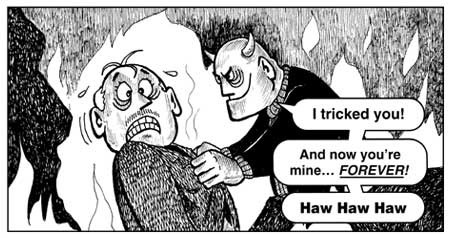Behind Door Number Three…
There is an old story in which a man, who has spent his whole life pulling the legs off bugs, dies and goes straight to hell. After the paperwork has been filled out he is sent to the relevant part of Hades to receive his punishment.
As he is walking the demon who leads the way tells him that because his sin isn't too bad he will get to choose between three alternatives.
He is then brought to a corridor with three doors and told that he can decide which room to spend eternity in. The demon opens the first door and the man is greeted with the sight of around a dozen people standing in a pool of excrement that reaches up to their shoulders.
Then he is led to the second room, which is like the first in every way except this time people are standing in excrement that reaches up to their waists.
Finally the demon shows him the third room, which is similar to the other two. Only this time the excrement barely reaches the inhabitants knees. In addition to this everyone is chatting, drinking cups of tea and eating digestive biscuits.
The young man quickly makes his decision, choosing the third room. His guide shrugs his shoulders and leads the way. Sure enough the man is given a nice hot cup of tea and a biscuit by one of the demons in charge. But after a few minutes a horn sounds and the demon shouts,
"Right lads, tea breaks over, back on your heads"
It is not hard to picture the task of decision-making regarding political systems as taking place in a similar environment. Each room stinks but we got to choose one. Of course, in reality, no single individual chooses which door everyone has to walk through. This is decided through a complex set of processes over which we have little input.
But most of us, if presented with the choice, would pick the room with the best conditions; the one with a little s**t but also with some nice tea and biscuits. And perhaps that is the room we, as a society, chose. It is a room that promised certain benefits and delivered on them. But then, just as we were getting comfortable, we got turned on our head.
Occupy Wall Street can look like one segment of society standing against another. And no doubt that is how many people on both sides of the debate experience it. Yet perhaps we can look beyond that and see this as transcending the usual political lines. Viewing it as a demand for genuine political discourse that enables the poor to put real alternatives on the table. Not idealistic alternatives, but alternatives which don't involve sitting around waiting for the next economic tea break, alternatives which consider different ways to ensure so many people don't have to spend so much of their lives face down in the s**t.
Something that people who care about society will welcome regardless of political stance.
Peter Rollins's Blog
- Peter Rollins's profile
- 314 followers




